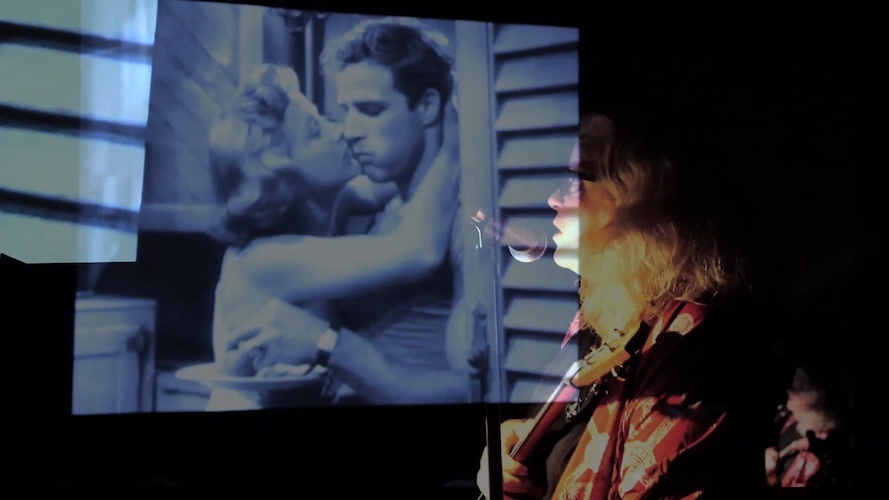Event Type
“A Neo-Benshi Streetcar," written and performed by Roxi Power, is a series of interrelated live film narrations: “Lulu and Blanche” from Miss Lulu Bett; “One Streetcar May Hide Another” from A Streetcar Named Desire; “Compact Rebel” from Rebel without a Cause; and the newest: “Hugo Ball v. The Machine Man” from Metropolis. The first three were performed as a triptych in The Provincetown Tennessee Williams Festival. The Provincetown Banner wrote of the show, “The excellent and unusual “A Neo-Benshi Street Car,” a live film voice-over created by Roxi Power, who artfully imposed her words upon excerpts from the movie, opened up a new way of seeing the characters in Williams’ A Streetcar Named Desire. Based on a Japanese tradition of narration (nicely complementing the kabuki “Milk Train”) over silent films, Power plays with drag, gender identity and poetry.”
During the silent film era in Japan and Korea, the benshi, or film-teller, stood to the side of the screen and narrated the film’s plot. There were tens of thousands of benshis, more powerful and popular than actors or directors, each with their own style–from the documentary to the theatrical. In my “Neo-Benshi,” I ventriloquize, matching my new words to the screen actors’ lip movements, to create an alternative storyline and a kind of spoken “musical score” to the films that relies on synchronicity and voice work in the tradition of Mel Blanc.
In 2003, a group of poets in San Francisco innovated “Neo-Benshi” by turning down the film’s volume and rewriting an excerpt of the plot and dialogue. As the form became popular, experimental poets such as Douglas Kearney, Eileen Myles, Jen Hofer, Tisa Bryant, David Larsen, Stephanie Young, Rodney Koeneke, and I performed in venues around the country, aided by the filmmaker, Konrad Steiner. Outside of the Provincetown Tennessee Williams Festival, I have performed my original scripts at the Roy and Edna CalArts Theater (REDCAT) in Los Angeles, St. Mark’s Poetry Project in New York, The San Francisco Poetry Center, The Yerba Center for the Arts, San Francisco Poets Theater, and Universities and AWP offsite events around the country.
The three scripts of “A Neo-Benshi Streetcar” are thematized around the “drag” of poet and gender identities, playing off latent queer and feminist readings of the stories—especially in the two iconic films (Streetcar and Rebel)--with the lesser-known Miss Lulu Bett acting as a prequel to Streetcar. “Lulu and Blanche” plays with the history of how a Southern woman wields her magic--through cooking and clothing—and can become enslaved or liberated by these feminine trappings. “Lulu and Blanche” takes place in Blanche DuBois’s childhood home, Belle Reve, and reveals how Blanche–who [doesn't] want realism, [she] wants magic”--acquires her powers of witchcraft. The 1921 silent film, Miss Lulu Bett, chimes nicely with Neo-Benshi’s relation to silent film.
“One Streetcar May Hide Another” begins with Blanche returning “from beyond” (the asylum, where Stanley sent her), and using “drag” as a means to magically revise herself in this version. Like Tennessee (originally Thomas) Williams, Blanche likes to rename herself, as Stanley says, “after the whole south practically,” and calls herself “N’Orleans.” Her story resonates with the 2010 catastrophe, “Deepwater Horizon." The Derridean concept of the zombie (a figure that breaks the life/death binary) helps resurrect Blanche (“N’Orleans”) as the iconic symbol who refuses to die.
“Compact Rebel,” a psychological romp through gender’s house of mirrors and a foreshortened version of Nicholas Ray's classic, follows a mysterious compact mirror on its subversive journey. “Compact Rebel” is an indirect postscript to Streetcar, continuing the commentary on gender, language, and magical objects into the 50s--a few years after Streetcar takes place—through Marlon Brando’s sound-alike protégé, James Dean, whose self-reinventions share more in common with Blanche than with Stanley. In Rebel, identity is up for grabs in the “Gay 50s,” and everybody needs a “Daddy” to tell him what to do.
The final of these 20 minute performances is “Hugo Ball v. The Machine Man,” from Fritz Lang’s 1927 silent movie, Metropolis. Like James Byron Dean in Rebel–who secretly wants to be a Romantic Poet while his Dad (Jim Backus) wants him to be a Beat Poet–the protagonist of the rewritten Metropolis, Joh Freder, is in fact, Hugo Ball. He does battle with Moloch, F.T. Marinetti, and Andre Breton, to save the zombie-like laborers below Metropolis whose essences keep the city running. Hugo Ball scrambles language as a “pharmakon” to revive the work and poetry-weary minds of the workers. The show ends with a sing-along to The Talking Heads’ “I Zimbra," a musical version of Ball’s “Gadji Beri Bimba”:
In “Neo-Benshi: The Poet as Ventriloquist” (Viz. Inter-Arts: Interventions, 2016), I write, “In Neo-Benshi, as with other interventionist art forms, the effectiveness of the intervention–and the fun for the audience–emerge because there is a subversion of expectation through irony, defamiliarization, and detournement [similar to] the Situationists who filled in the dialogue bubbles of familiar comics with alternative, often subversive, speech… Aligned with the Drag Queen figure, the new benshi appropriates an overdetermined identity…filling false immanence with alternative presence to show that the original was empty too… Iconic films like Rebel and Streetcar are perfect vehicles for Neo-Benshi since viewers recognize the ironic allusions, giving the “drag” version its winking campy quality. How can you not see Blanche Dubois as a fading drag queen or Stella as a zombie as she walks in a trance down the stairs back into the arms of Stanley?”
I'm thankful to the organizers of the New Orleans Poetry Festival for considering the inclusion of a genre that is, in the words of Blanche Dubois, at least “50% illusion.". It has been my dream, since first performing Blanche's saga at the Provincetown Tennessee Williams Festival, to bring it to its cinematic hometown of New Orleans.
_________________________
Post-script: I spoke with Rodrigo Toscano and Henry Goldkamp at last year’s AWP in Philadelphia about performing my Neo-Benshi shows within the NOPF. Both were enthusiastic. Rodrigo suggested the Marigny Opera House. I am happy to provide sample video footage of my performances. Each performance in this hybrid, theater-film-poetry cabaret is about 20 minutes, bringing the total length of the show to 1 ½ hours or less. (I am open to different curatorial possibilities, performing some, rather than all, of the films). All that is needed is a screen, projector, laptop, microphone, and stand. Thank you.

